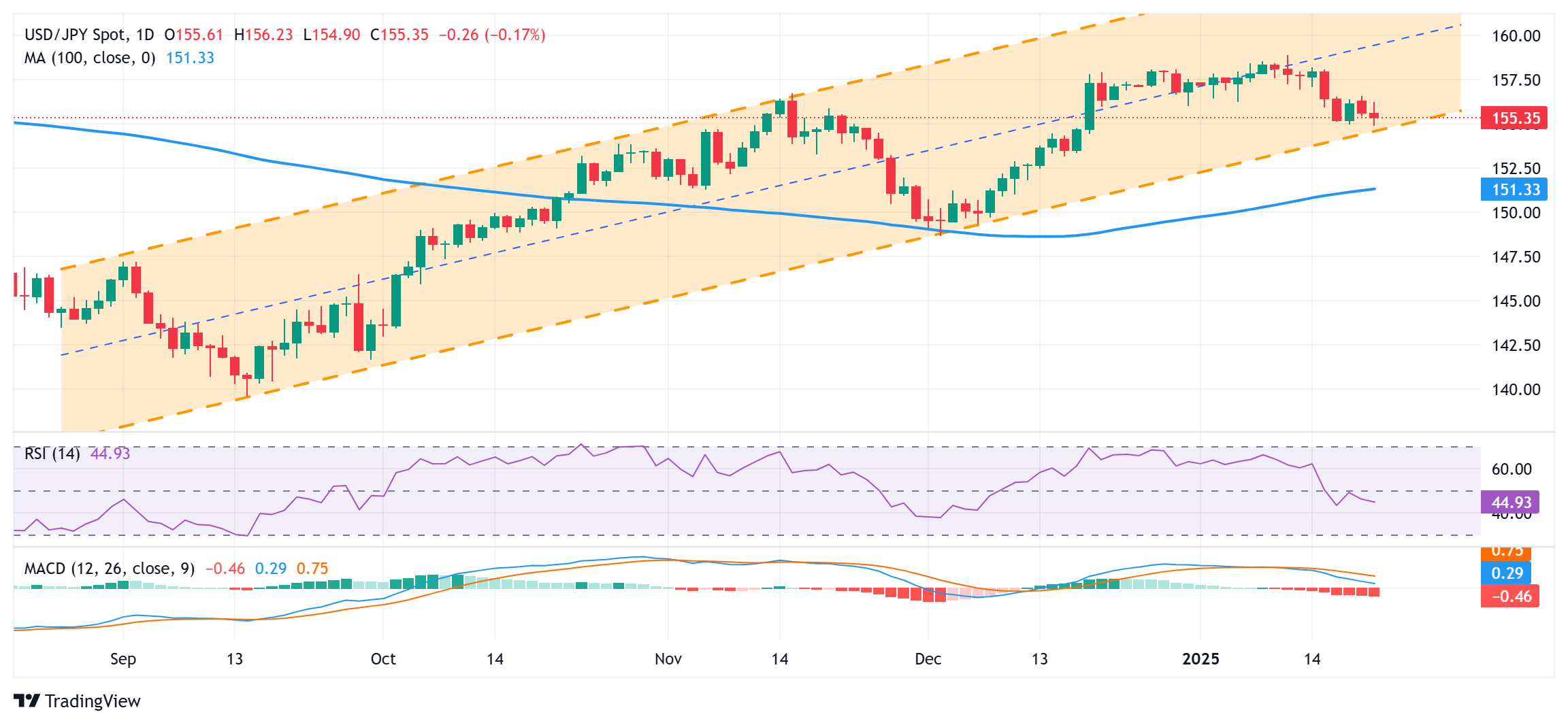Japanese Yen pulls back from multi-week top against USD after Trump’s comments
- The Japanese Yen weakened against the USD after Trump’s tariff remarks.
- The divergent BoJ-Fed expectations helped limit any further losses for the JPY.
- The narrowing US-Japan yield differential warrants caution for the JPY bears.
The Japanese Yen (JPY) retreats sharply after touching a five-week top against its American counterpart during the Asian session on Tuesday, with the USD/JPY pair rallying over 100 pips from levels below the 155.00 psychological mark in the last hour. US President Donald Trump's tariff remarks triggered a sharp US Dollar (USD) recovery from a two-week low touched on Monday and turned out to be a key factor behind the intraday JPY downfall. That said, a turnaround in the global risk sentiment offers some support to the safe-haven JPY.
Furthermore, firming expectations that the Bank of Japan (BoJ) will hike interest rates at its monetary policy meeting later this week contribute to limiting any meaningful JPY depreciation. Meanwhile, rising bets that the Federal Reserve (Fed) will lower borrowing costs twice this year led to the recent decline in the US Treasury bond yields. The resultant narrowing of the US-Japan rate differential is holding back traders from placing aggressive bearish bets around the JPY and keeping a lid on the intraday USD/JPY pair's positive move.
Japanese Yen bulls have the upper hand amid BoJ rate hike bets
- The recent hawkish comments from Bank of Japan Governor Kazuo Ueda and Deputy Governor Ryozo Himino, along with the broadening inflationary pressure in Japan, raised the odds for an imminent rate hike by the Japanese central bank. The markets are pricing in an 80% chance of a rate hike later this week.
- According to people familiar with the matter, BoJ will reach the final conclusion after examining economic data, markets and the implications of US economic policies. The view among the officials is that US President Donald Trump could ruffle markets or change expectations about the global economy.
- Trump said this Tuesday that he intends to impose 25% tariffs on Canada and Mexico, and the target date for tariffs would be as soon as early February. Trump's remarks revive inflation concerns, which could force the Federal Reserve to stick to its hawkish stance and prompt a sharp US Dollar recovery from a two-week low.
- The US Producer Price Index (PPI) and Consumer Price Index (CPI) released last week pointed to signs of abating inflation. This suggests that the Fed may not exclude the possibility of rate cuts by the end of this year, which keeps the US Treasury bond yields depressed and acts as a headwind for the Greenback.
- There isn't any relevant market-moving economic data due for release on Tuesday, either from Japan or the US. Moreover, the focus remains glued to the highly-anticipated two-day BoJ policy meeting starting on Thursday, which will play a key role in determining the near-term trajectory for the Japanese Yen.
USD/JPY bears await sustained break below ascending channel support
From a technical perspective, the USD/JPY pair continues to show some resilience below the 155.00 mark and so far, has managed to defend a support representing the lower boundary of a multi-month-old ascending channel. This makes it prudent to wait for a convincing breakdown and acceptance below the said support levels before positioning for an extension of the recent downfall from a multi-month top. Spot prices might then accelerate the slide towards the 154.50-154.45 intermediate support en route to the 154.00 round figure, the mid-153.00s, and the 153.00 mark.
On the flip side, the Asian session peak, around the 156.25 region, now seems to act as an immediate hurdle. Some follow-through buying beyond the overnight swing high, around the 156.58-156.60 area, could allow the USD/JPY pair to reclaim the 157.00 mark. The recovery momentum could extend further towards the 157.25-157.30 area en route to the 157.60 region and the 158.00 round figure. A sustained strength beyond the latter could set the stage for a move towards retesting the multi-month peak, around the 159.00 neighborhood touched on January 10.
Japanese Yen FAQs
The Japanese Yen (JPY) is one of the world’s most traded currencies. Its value is broadly determined by the performance of the Japanese economy, but more specifically by the Bank of Japan’s policy, the differential between Japanese and US bond yields, or risk sentiment among traders, among other factors.
One of the Bank of Japan’s mandates is currency control, so its moves are key for the Yen. The BoJ has directly intervened in currency markets sometimes, generally to lower the value of the Yen, although it refrains from doing it often due to political concerns of its main trading partners. The BoJ ultra-loose monetary policy between 2013 and 2024 caused the Yen to depreciate against its main currency peers due to an increasing policy divergence between the Bank of Japan and other main central banks. More recently, the gradually unwinding of this ultra-loose policy has given some support to the Yen.
Over the last decade, the BoJ’s stance of sticking to ultra-loose monetary policy has led to a widening policy divergence with other central banks, particularly with the US Federal Reserve. This supported a widening of the differential between the 10-year US and Japanese bonds, which favored the US Dollar against the Japanese Yen. The BoJ decision in 2024 to gradually abandon the ultra-loose policy, coupled with interest-rate cuts in other major central banks, is narrowing this differential.
The Japanese Yen is often seen as a safe-haven investment. This means that in times of market stress, investors are more likely to put their money in the Japanese currency due to its supposed reliability and stability. Turbulent times are likely to strengthen the Yen’s value against other currencies seen as more risky to invest in.

